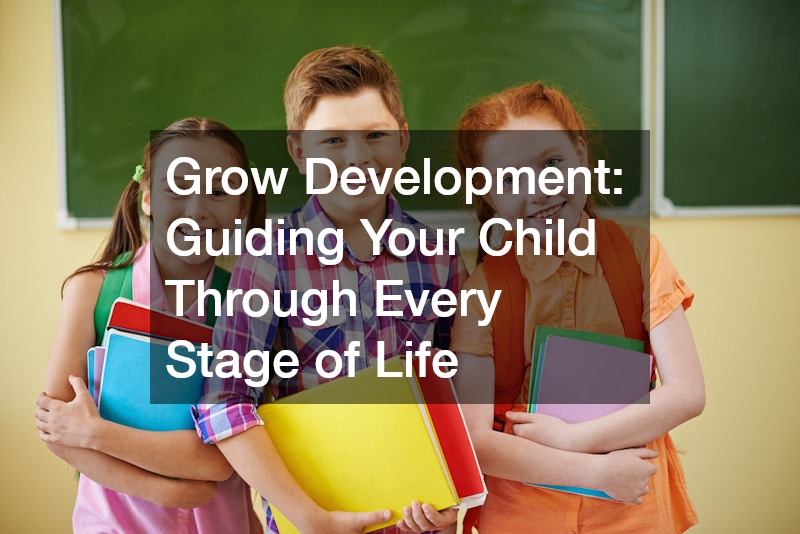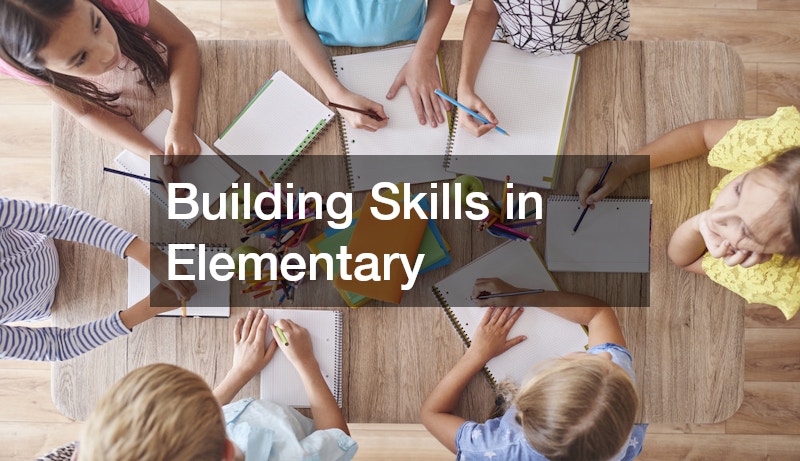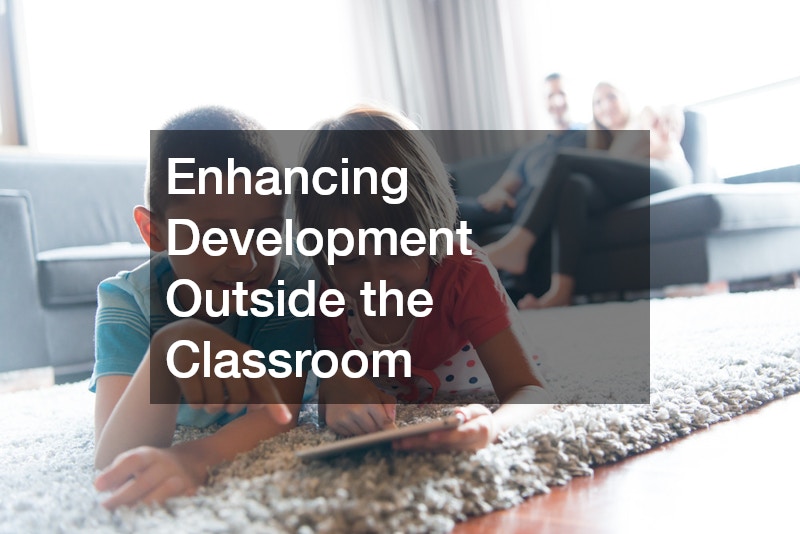Grow Development: Guiding Your Child Through Every Stage of Life


Parenting is an ever-evolving journey of nurturing, teaching, and guiding children as they navigate life’s many stages. As parents, we often act as life coaches, helping our children navigate challenges, celebrate achievements, and discover their unique talents. It’s a role that requires patience, creativity, and a deep understanding of what children need to grow into confident and capable individuals. At the heart of this journey lies the idea of grow development, a holistic approach that encompasses the physical, emotional, and cognitive growth of a child throughout their life.
Each stage of childhood brings its own joys and challenges, from the first steps and words to the more complex milestones of adolescence. Parents serve as their children’s first mentors, shaping how they perceive and respond to the world around them. By fostering curiosity, resilience, and a love of learning, parents can provide the foundation children need to thrive.
Grow development emphasizes the importance of not only meeting a child’s basic needs but also encouraging their individuality and interests. Whether it’s through structured education, creative activities, or simply spending quality time together, these moments contribute to shaping a well-rounded and self-assured person.
This guide delves into strategies and activities tailored to every stage of your child’s life, offering insights and practical ideas to help them reach their fullest potential. By embracing the principles of grow development, you’ll create an environment where your child feels supported and inspired, setting the stage for a successful and fulfilling future.
The Foundation: Early Childhood Development
The early years of a child’s life are critical for learning, and you can grow development by helping them reach milestones. During this period, children begin to form the habits and skills that will carry them through their educational journey and beyond. Daycare is often one of the first structured settings where children are exposed to new routines and environments outside their homes. It provides a safe space for children to socialize with peers, learn basic interpersonal skills, and begin exploring the world through play and guided activities. These early interactions are instrumental in building their capacity for empathy, cooperation, and problem-solving—skills that are vital for future relationships and teamwork.
Preschool expands upon this early foundation by introducing a more structured learning environment. Children in preschool engage in activities that stimulate cognitive, social, and emotional growth. Whether it’s learning to identify numbers and letters, practicing fine motor skills through art projects, or engaging in imaginative play, these experiences help children build confidence and a love for learning. Preschool also fosters independence as children learn to follow instructions, complete small tasks, and navigate social dynamics.
Building Skills in Elementary
Elementary school represents a pivotal stage in your child’s journey, serving as the bridge between foundational early education and more specialized learning in later years. During these formative years, children are introduced to a wide range of subjects, from math and science to language arts and social studies. These diverse academic experiences allow them to explore their strengths, develop problem-solving skills, and cultivate a natural curiosity about the world around them.
Beyond academics, elementary school is a time when children begin to form a sense of identity and self-confidence. They start identifying personal interests and hobbies, which can pave the way for lifelong passions. Friendships also play a crucial role during this period. Learning how to navigate relationships, resolve conflicts, and collaborate with peers helps children build strong social skills that are essential for success in every stage of life.
Extracurricular activities provide additional opportunities to grow development. Encouraging your child to participate in activities like sports, music lessons, or creative arts programs can enrich their experience both inside and outside the classroom. For instance, team sports teach discipline, perseverance, and the value of working together toward a common goal, while music lessons nurture creativity and improve focus. Programs like chess clubs or robotics teams can further enhance problem-solving skills and foster a love for learning.
Additionally, elementary school is an ideal time to introduce community involvement. Volunteering in local events or participating in school initiatives like recycling programs can instill a sense of responsibility and connection to the world around them.
By actively supporting your child’s interests and providing encouragement during this stage, you can help them build a strong foundation of skills and values. These experiences not only contribute to their overall development but also set the stage for a fulfilling and successful journey through middle school, high school, and beyond.
Navigating High School: Preparing for the Future
High schools are an essential phase in your child’s development, marked by increased independence and the opportunity to start defining their aspirations and plans for the future. During this stage, academic performance and extracurricular involvement take on greater significance, as they lay the groundwork for college applications or career choices. High school offers a wealth of opportunities for personal growth, and as a parent, your support and guidance are crucial in helping your child make the most of this formative time.
Private schools can be a beneficial option during the high school years, as they often provide specialized programs tailored to specific interests or career goals. Smaller class sizes may also enable more personalized instruction, allowing students to thrive in an environment that nurtures their unique talents and abilities. Additionally, many private schools offer access to advanced courses, mentorship opportunities, and extracurricular activities that can give students a competitive edge as they prepare for their next steps.
Encouraging your high schoolers to participate in summer camp programs is another excellent way to support their development. Camps that focus on science, technology, arts, or leadership can provide immersive experiences where teens develop practical skills, build confidence, and form lasting connections with peers who share similar interests. These programs not only enhance their academic and social abilities but also allow them to explore potential career paths in a low-pressure setting.
High school is also an ideal time to discuss long-term goals and aspirations. Have open conversations with your child about their interests, strengths, and dreams. Help them research and identify potential fields of study or career options that align with their passions. Whether they are drawn to creative pursuits, technical fields, or community-focused roles, connecting their current interests to future opportunities can instill motivation and a sense of purpose.
By fostering a supportive environment and encouraging exploration, you help your child build the confidence and skills they need to navigate the challenges and opportunities of high school successfully. This foundation will serve them well as they transition to adulthood and continue to grow into capable, well-rounded individuals.
Enhancing Development Outside the Classroom
While formal education is a cornerstone of a child’s development, the activities they engage in outside of school also play an essential role in fostering their growth. These extracurricular experiences help nurture a well-rounded individual by encouraging skills that extend beyond the classroom, such as creativity, resilience, and interpersonal communication.
Adaptive gymnastics, for example, is an excellent option for children of all abilities. This inclusive activity not only promotes physical strength, balance, and coordination but also fosters self-confidence and teamwork. It provides an opportunity for children to challenge themselves in a supportive environment while celebrating their achievements. Adaptive gymnastics is particularly impactful for children with disabilities, as it encourages both personal growth and social interaction in an empowering way.
Community programs and volunteer opportunities are another valuable avenue for child development. By engaging in activities that help others, children learn empathy, responsibility, and the importance of contributing to their communities. Whether it’s participating in a neighborhood cleanup, assisting at an animal shelter, or mentoring younger peers, these experiences instill a sense of purpose and accomplishment.
For teenagers, gaining real-world experience is a critical step in bridging the gap between academics and future aspirations. Part-time jobs, internships, or shadowing professionals in fields of interest offer invaluable insights into potential career paths. These experiences provide teens with a practical understanding of workplace expectations and help them develop transferable skills like time management, problem-solving, and adaptability. Shadowing professionals can be especially impactful, allowing teens to explore different industries and make informed decisions about their long-term goals.
Extracurricular activities like sports, arts, and community service allow children to discover their passions and build resilience in the face of challenges. By encouraging these pursuits, you provide your child with opportunities to grow development gain confidence, and develop a strong sense of identity. These activities complement formal education, creating a comprehensive foundation for lifelong success.
Family Bonding and Personal Growth
In the midst of busy schedules and competing priorities, setting aside quality time with your child is crucial for building a strong relationship and supporting their emotional well-being. Bonding activities not only foster deeper connections but also create a foundation of trust and open communication. These moments of togetherness serve as a reminder of your unwavering support in their life journey.
Consider planning special outings or engaging in activities that resonate with both of you. Visiting a beauty school for makeovers, for instance, can be a fun and confidence-boosting experience, especially for teens exploring self-expression. Alternatively, a cooking class allows you to collaborate creatively while learning a new skill together. These shared experiences help break away from the routine and create cherished memories your child will carry into adulthood.
Life coaches often stress the importance of balance in personal growth, and as a parent, you naturally take on a similar role. By helping your child navigate their responsibilities while encouraging joy and mindfulness in everyday moments, you equip them with the tools to lead a balanced and fulfilling life. Whether it’s through heartfelt conversations, playful activities, or shared hobbies, prioritizing time together enriches your relationship and reinforces the value of family connections in shaping their development
Encouraging Lifelong Learning
Instilling a love for learning is one of the greatest gifts you can give your child. This doesn’t just mean excelling in school; it also involves fostering curiosity and resilience. Encourage your child to set goals, celebrate their achievements, and learn from their mistakes.
Support their interests by providing access to resources, whether it’s books, online courses, or workshops. Whether your child dreams of becoming an artist, an engineer, or a teacher, the concept of grow development remains at the heart of their journey.
Helping your child navigate the stages of life is a multifaceted journey that requires a thoughtful balance of education, activities, and emotional support. Each stage, from daycare and preschool to high school and beyond, offers unique opportunities to foster growth and help your child build the foundation for a successful future. By embracing a grow development mindset, you can create a nurturing environment that supports their holistic development while celebrating their individuality.
The early years are crucial for laying the groundwork. Daycare and preschool environments are more than places for supervision—they are where children begin to develop social skills, independence, and a love of learning. As they move into elementary school, they start to explore their interests and build academic foundations. Encouraging curiosity and a growth mindset at this stage can lead to greater confidence and resilience.
High school is a transformative phase where children begin to discover their identity and aspirations. Supporting them in academic pursuits, extracurricular activities, and personal interests helps them refine their skills and set the stage for adulthood. Beyond academics, fostering open communication and providing emotional support is essential for guiding them through challenges and milestones.
Beyond formal education, enrichment activities play a vital role in personal growth. From adaptive gymnastics to summer camps, these experiences teach teamwork, discipline, and self-expression. Activities outside the classroom allow children to explore their passions and develop skills that will benefit them throughout their lives. Engaging in activities together, such as spending a day getting makeovers or enjoying a shared hobby, also strengthens the bond between parent and child, creating lasting memories.
Ultimately, the journey of grow development is about empowering your child to embrace their potential and navigate life with confidence. By fostering personal connections, exploring coordinated opportunities, and encouraging exploration, you give your child the tools they need to succeed. As they progress through life, your ongoing support and guidance will remain a cornerstone of their development.
Every phase of childhood is a chance to nurture your child’s abilities and character, ensuring they thrive in every stage of life. By maintaining a focus on grow development, you contribute to a brighter future for your child, helping them reach their full potential and achieve lifelong success.











